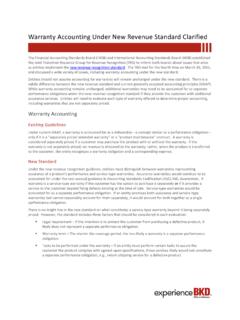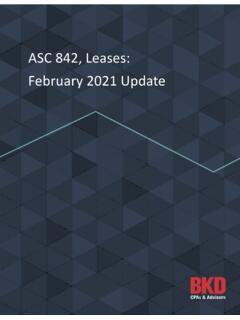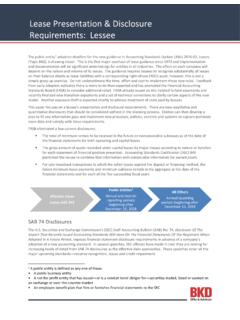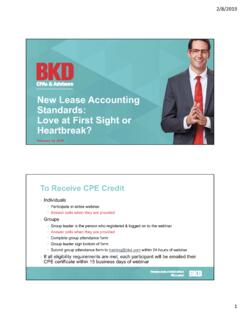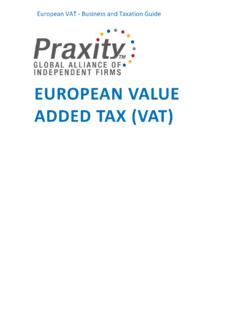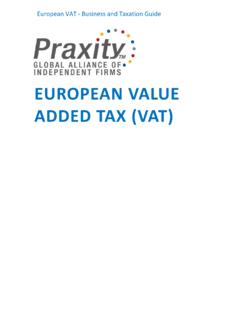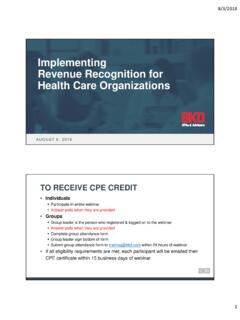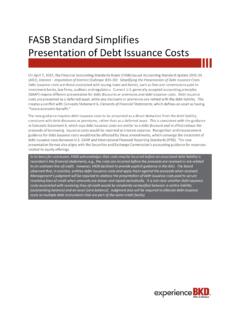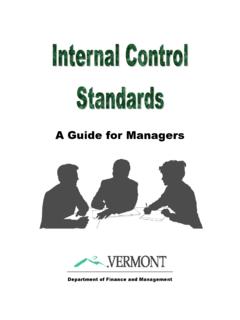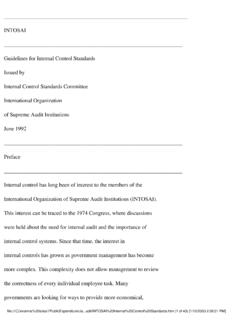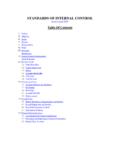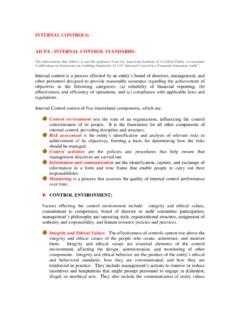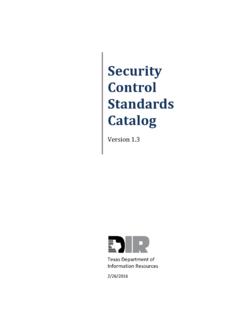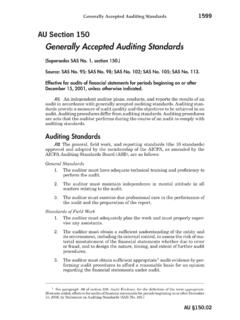Transcription of Internal Control Requirements for Adopting New Accounting ...
1 Internal Control Requirements for Adopting New Accounting standards Background In previous articles, BKD discussed the Securities and Exchange Commission s (SEC) expectations regarding the requirement to disclose the effect that recently issued Accounting standards will have on a registrant s financial statements when adopted in a future period, as required by SEC Staff Accounting Bulletin* (SAB) Topic (SAB 74). As the effective dates of major standards issued by the Financial Accounting standards Board (FASB) approach, preadoption (transitional) disclosures under SAB 74 should become qualitatively and quantitatively more elaborate and specific. Likewise, management s assessment and disclosure of changes in its Internal Control over financial reporting (ICFR)** is expected to change, as depicted in Appendix A.
2 Changes in Internal controls while transitioning to new financial Accounting standards are caused by risks inherent during this time, which can be summarized into three categories: Processes to capture data necessary to accumulate the new standard s effect on the entity s financial statements fail to ensure accurate, complete and easily understandable SAB 74 disclosures. SAB 74 disclosures should include the financial statement effect caused by the new recognition, measurement, presentation and disclosure Requirements Accounting and financial reporting process changes, including information technology (IT) system changes made to comply with the new standards Requirements , fail to ensure the new standard is effectively adopted resulting in financial statements, including disclosures, that are not fairly presented, in all material respects, in accordance with generally accepted Accounting principles (GAAP)
3 Significant changes to ICFR are not captured and disclosed, or are not disclosed in a timely, accurate, complete and understandable manner Management s annual ICFR assessment should be based on evidence about how the entity s ICFR is operating in relation to its risk assessment. Control design and implementation changes (or expected changes) identified through management s risk assessment process should be evaluated preadoption, upon adoption and postadoption to determine whether they represent a substantial change to the filer s ICFR and require disclosure. This article highlights the importance of and discusses practice points for capturing and disclosing significant changes to ICFR over the transitional period.
4 * SEC Staff Accounting Bulletin 74, codified as SAB Topic , Disclosure of the Impact That Recently Issued Accounting standards Will Have on the Financial Statements of the Registrant When Adopted in a Future Period. Controls over SAB 74 disclosures and the capturing and reporting of quarterly ICFR changes often can be an afterthought as companies focus on processes for Adopting measurement and recognition Requirements of newly effective standards . Likewise, processes for complying with new footnote disclosure Requirements may be a secondary priority. However, the disclosure Requirements mandated by FASB s new revenue standard, Accounting standards Update (ASU) 2014-09, Revenue from Contracts with Customers, for example, are extensive.
5 ICFR applies to disclosures as equally as it does to the main financial statements, and companies are encouraged to heed the SEC s recent scrutiny of ICFR. Companies not required to be compliant with Sarbanes-Oxley Act of 2002 (SOX) are encouraged to maintain awareness that their auditors are required to obtain an understanding of the company s Internal Control system design and implementation as part of their audit engagement, including specific attention to fraud risk. Internal Control Requirements for Adopting New Accounting standards 2 ** Management is required to evaluate and assess ICFR under Section 13(a) or 15(d) of the Securities Exchange Act of 1934, an implementation of Section 404 of SOX.
6 The rules the SEC adopted in June 2003 to implement Section 404 require management to annually evaluate the effectiveness of its ICFR and to disclose its assessment to investors. SEC Final Rule No. 33-8238, Management s Report on Internal Control Over Financial Reporting and Certification of Disclosure in Exchange Act Periodic Reports, requires disclosure of significant changes to an entity s ICFR. Item 308(c) of Regulation S-K requires filers to disclose material changes to ICFR. SAB 74 & ICFR Dis closure Controls Overview of SAB 74 Disclosures In addition to disclosing the expected financial statement effect of recently issued standards (when the standard will be adopted in a future period), SEC filers are required to disclose in the notes to the financial statements.
7 The status of the implementation process, including the nature of significant implementation matters that have not been addressed The transition method elected (full or modified retrospective), including practical expedients A comparison of the company s current Accounting policies with the Accounting policy under the new standard If a company does not know the expected effect, or cannot reasonably estimate, this fact should be disclosed. In those cases, the quantitative disclosure of the new standard s effect should be replaced with a qualitative description of the new Accounting policies effect and a comparison of the new Accounting Requirements to the company s current Accounting .
8 ICFR Includes SAB 74 Disclosures Management s ICFR assessment includes controls designed to help ensure that financial statements, including the footnotes, are prepared in accordance with GAAP. Because transitional disclosures required under SAB 74 are part of the notes to the financial statements, controls around them are included in the ICFR annual assessment in years prior to Adopting a newly issued standard. Management is required to disclose in the entity s quarterly Exchange Act reports changes in Internal controls that have or will materially affect the issuer s ICFR. In doing so, it should consider short-term circumstances and risks uniquely present during the adoption period.
9 Significant new controls may include controls to ensure accurate, complete and understandable SAB 74 disclosures and controls to address risks associated with process changes to develop and support significant judgments and estimates, for example, which will be necessary to recognize revenue and provide the required ASU 2014-09 disclosures. Management would evaluate the risk that process changes will result in in accurate and unreliable financial reporting in the current reporting period (and future reporting periods). Henceforth, capturing significant changes to ICFR (and ensuring appropriate disclosure of these changes) requires processes and controls of its own generally including oversight by knowledgeable personnel with appropriate authority, , senior management, Internal audit and disclosure committee.
10 Judgments required to identify newly required processes and controls often will require a careful evaluation of the detailed information regarding the nature, design and economic substance of contracts and changes thereto. Applying the new concepts, particularly for companies with complex contracts or reporting revenue from more than one revenue stream, may require more resources and collaborative effort across the company than originally planned. Internal Control Requirements for Adopting New Accounting standards 3 Practice Points: Revenue recognition is one of the most common issues triggering an ICFR material weakness, primarily due to Accounting and financial reporting complexity and subjectivity and the elevated risk of financial statement fraud and management override.
